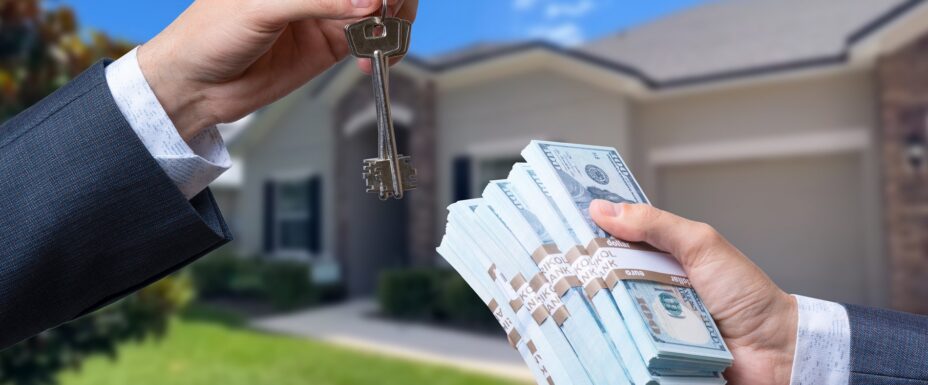The Home Appreciation Handbook: How To Determine the Right Time to Sell
Reviewed by: Brandon Brown
When you first bought your home, you may not have seen it as an investment. Instead, you might have only thought of it as a place to live and create memories with your family.
Or maybe you did buy a house to reap the rewards when you sell. After all, real estate is often an inflation-proof form of investment that allows you to build equity.
No matter how you see it, your home is an investment. And when you go to sell your house, there’s one factor that matters most of all: Home appreciation.
No, we’re not talking about how much you cherish your house. In this comprehensive handbook, we’re laying out everything you need to know about how property value changes as time passes.
What Does Home Appreciation Mean?
There are many terms used to describe a property’s value whether you’re buying or selling, including appraised value vs market value. In this case, home appreciation describes what happens to that value.
The term home appreciation refers to a property’s increase in value over time. If your house is worth more now than it was last year, you would say it has appreciated in that time.
The easiest way to visualize real estate appreciation is to think of it as your return on investment (even if you didn’t buy your home as an investment property). You paid a certain amount of money to purchase your house. If your house appreciates and you sell it five years later for twice as much, your home’s appreciation (and therefore your ROI) is 100%.
With that said, home appreciation isn’t strictly about earning more when selling your house. An increase in home value can benefit you whether you’re moving or staying put. Most notably, if your house appreciates while you’re living in it, your home equity can increase, too.
Your home equity is the difference between how much you owe on your mortgage and the market value of your home. With more equity, you can borrow more money against your home to fund other projects.
Appreciation vs. Depreciation
Home appreciation is not always linear. In fact, the future value of a property may not increase in the eyes of the real estate market. The opposite of home value appreciation is depreciation. A depreciating asset loses value over time, making it worth less than it was when you bought it.
Cars, for example, are depreciating assets—they lose at least 10% of their value the moment you drive them off the lot, and a whopping 60% after five years.
Luckily, homes aren’t like vehicles. Real estate tends to appreciate, especially over lengthier periods. Even someone who bought a home right before the 2008 housing crash would have seen their home value appreciate by 7.73% ten years later. While U.S. housing market trends can contribute to temporary fluctuations in price point, the value of a home will typically rise in the long run.
Factors That Contribute to Home Appreciation
So, how does it happen? How do homes appreciate over time? It’s not magic (though sometimes it occurs with minimal effort on your part).
Homes appreciate over time due to several factors:
-
Supply and demand – The law of supply and demand is the most important driver of a home’s value. If there are more people buying in your hometown than there are selling, this added demand will likely cause your home value (and the value of your neighbors’ homes) to rise. But when supply outpaces demand, buyers have the upper hand, and your home may not sell for as much.
-
Location – Location is one of the top selling features of a home and can play a significant role in determining price point. Your home’s location is part of the supply-demand equation, but it’s worth looking at location as a separate category. That’s because the land on which your home sits is one of the primary drivers of value. If that land (read: your location) has become more desirable since you bought your home, you might see significant growth in home price appreciation.
-
Home maintenance and improvements – Without regular maintenance, your home would fall into disrepair and likely depreciate over time. By maintaining your home, you at least keep depreciation at bay. However, when you make your home more appealing, its value can appreciate. Renovations like updating the kitchen, redoing the roof, or adding square footage can cause your home’s value to swell.
-
Inflation – Inflation is the phenomenon that causes purchasing power to decrease and the price of all goods—including housing—to rise. In 1940, the median US home was worth just $2,938; today, thanks to inflation, the median home value is $385,800. No amount of renovations is going to give you an appreciation of this degree. Only time and inflation can do that.
Naturally, the flip side of any of these factors can lead to depreciation. If your home’s location suddenly becomes less desirable—for instance, if a smog-spewing factory opens up nearby— you may see your property value decrease.
The keyword here is “may.” Because all the above factors work together to determine your home’s value, appreciation and depreciation are more complicated than meets the eye.
How to Calculate Home Appreciation
Although understanding why houses appreciate can be challenging, determining how much they’ve appreciated is more cut and dry.
You can depict home value appreciation in one of two ways:
-
As a dollar value – To determine the total change in the value of your home, subtract your purchasing price from its current value. For example, if you bought your home for $250,000 and it’s now worth $400,000, your home appreciation is $150,000.
-
As a percentage – To determine your home value’s growth percentage, take the change in value from the equation above, divide it by the original purchase price, then multiply it by 100. Using the above example, if you divide $150,000 by $400,000 and then multiply it by 100, you’re left with an appreciation percentage of 37.5%.
These formulas allow you to see how much your home has appreciated from its initial value or purchase price since you bought it. But you can also use publicly-available real estate data to calculate how much your home should appreciate in the future.
To do that, you’ll need to find the appreciation rate for your area. You can check your municipal or state government website for details, or look for third-party real estate reports. Once you know the estimated appreciation rate, you can use the following formulas:
(1.0 + the appreciation rate) x (The number of years) = The appreciation factor
(The appreciation factor) x (Your home’s current value) = The appreciation value for the specified number of years
When Home Appreciation is a Drawback
You might think that home appreciation is a blessing with no downsides. But we’d be remiss not to mention that house appreciation has its drawbacks. When your home’s value rises, so might your:
-
Insurance premiums – Your homeowners insurance covers any incidents that cause damage to your home’s interior or exterior. If your home is worth more, the cost to cover potential damages may also increase. Depending on your insurance policy, your insurance premiums could follow suit. Additionally, because a higher home value means a higher net worth, you may want additional insurance coverage to protect yourself from lawsuits.
-
Property taxes – Your property tax amount also depends on the value of your home. When your home value appreciates, your yearly property taxes may rise too, and you’ll pay more to the government each year—even if nothing about your home has changed.
As such, if you have little liquidity (i.e., your cash is tied up in your home and other investments) or your wages aren’t rising alongside your home value, an increase in home appreciation could be a disadvantage. Unless, of course, you’re ready to sell your home.
What Home Appreciation Means for Sellers
Overall, having your home appreciate is excellent news. It means your real estate investment—whether intentional or not—is paying off. Appreciation is especially welcome when you go to sell your home, as you’ll likely end up with more cash in hand to fund your next home.
With that said, there’s one aspect of home appreciation that sellers need to be aware of: Capital gains tax.
When your home appreciates, you stand to make a profit from selling it. Whenever you turn a profit from an investment (such as real estate), you have to pay capital gains tax on it unless you qualify for an exemption.
Thankfully, whether it’s your first time selling a house or your fifth, your chances of paying capital gains tax on a home sale are relatively low. You’ll only have to pay capital gains tax if:
-
You’ve owned and lived in your home for two of the five years prior to the sale date
-
You make a profit of less than $250,000 (or $500,000 if you’re married and file a joint return)
In other words, if your home appreciates significantly and you haven’t lived in it for long, you may end up paying for it when you sell it (though you’ll probably still come out on top). Otherwise, you’re probably A-OK.
Capitalize on Your Home Appreciation
It’s one thing to know how much your house has appreciated—or will appreciate—in value. But it’s another to take advantage of your home price appreciation when you sell.
At FlipSplit, we do everything we can to ensure your home’s true value is recognized. When we make an offer on your home, we do so at fair market value—which means we account for any appreciation.
From there, we carry out any home improvements that will boost home appreciation even more. Then, when we sell the home, you get a check for 50% of the profit. It’s that simple.
Ready to capitalize on your home’s appreciation? To find out how much your home is worth, request an offer today.
Sources:
- Investopedia. Key Reasons to Invest in Real Estate. https://www.investopedia.com/articles/mortgages-real-estate/11/key-reasons-invest-real-estate.asp
- Consumer Reports. How to Benefit From Rising Home Prices. https://www.consumerreports.org/real-estate/rising-home-prices/
- US Bank. How does a home equity loan work? https://www.usbank.com/home-loans/home-equity/how-home-equity-loans-work.html
- CARFAX. Car Depreciation: How Much It Costs You. https://www.carfax.com/blog/car-depreciation
- Forbes. What Does A Recession Mean For The Housing Market? https://www.forbes.com/sites/qai/2022/10/11/what-does-a-recession-mean-for-the-housing-market/?sh=636f08215fe5
- McKinsey. What is inflation? https://www.mckinsey.com/featured-insights/mckinsey-explainers/what-is-inflation
- CNBC. Here’s how much housing prices have skyrocketed over the last 50 years. https://www.cnbc.com/2017/06/23/how-much-housing-prices-have-risen-since-1940.html
- CNN. Here’s what to expect in the housing market this year. https://www.cnn.com/2023/01/05/homes/what-to-expect-in-the-housing-market-in-2023/index.html
- Indeed. Appreciation Calculation: Definition, Formula and Example. https://www.indeed.com/career-advice/career-development/appreciation-calculation
- Consumer Reports. How to Benefit From Rising Home Prices. https://www.consumerreports.org/real-estate/rising-home-prices/
- Investopedia. Property Tax: Definition, What It’s Used For, How It’s Calculated. https://www.investopedia.com/terms/p/propertytax.asp
- Turbotax. Tax Aspects of Home Ownership: Selling a Home. https://turbotax.intuit.com/tax-tips/home-ownership/tax-aspects-of-home-ownership-selling-a-home/L6tbMe3Dy

Reviewed by: Brandon Brown
As a long-time Asset Manager, Investor, Real Estate Agent, and Broker/Owner of BayBrook Realty in Orange County, Brandon Brown is one of FlipSplit’s lead Real Estate experts. Having worked on over 2,000+ real estate transactions, Brandon brings a depth of knowledge that ensures clients are appropriately treated with honesty and integrity. His insights and advice have been published in numerous blogs beyond FlipSplit, and he keeps a close eye on market trends and statistics, which are updated weekly on his social media pages. Outside work, you can find him participating and serving at church, cycling, mountain biking, surfing around Orange County and beyond, and enjoying time with his wife and two daughters.










